Boere sien dat hul brandstofrekeninge elke jaar styg, terwyl hulle druk ondervind om meer volhoubaar te wees. Dit word vasgevang tussen stygende koste en omgewingsverantwoordelikheid, 'n probleem wat hul winste direk beïnvloed.
Elektriese driewiele bied 'n kragtige oplossing deur emissies drasties te besnoei, bedryfskoste te verlaag en 'n gesonder werksomgewing te skep. Saam met sonkrag op die plaas, skep hulle 'n byna nul-koolstof, selfversorgende vervoerstelsel.
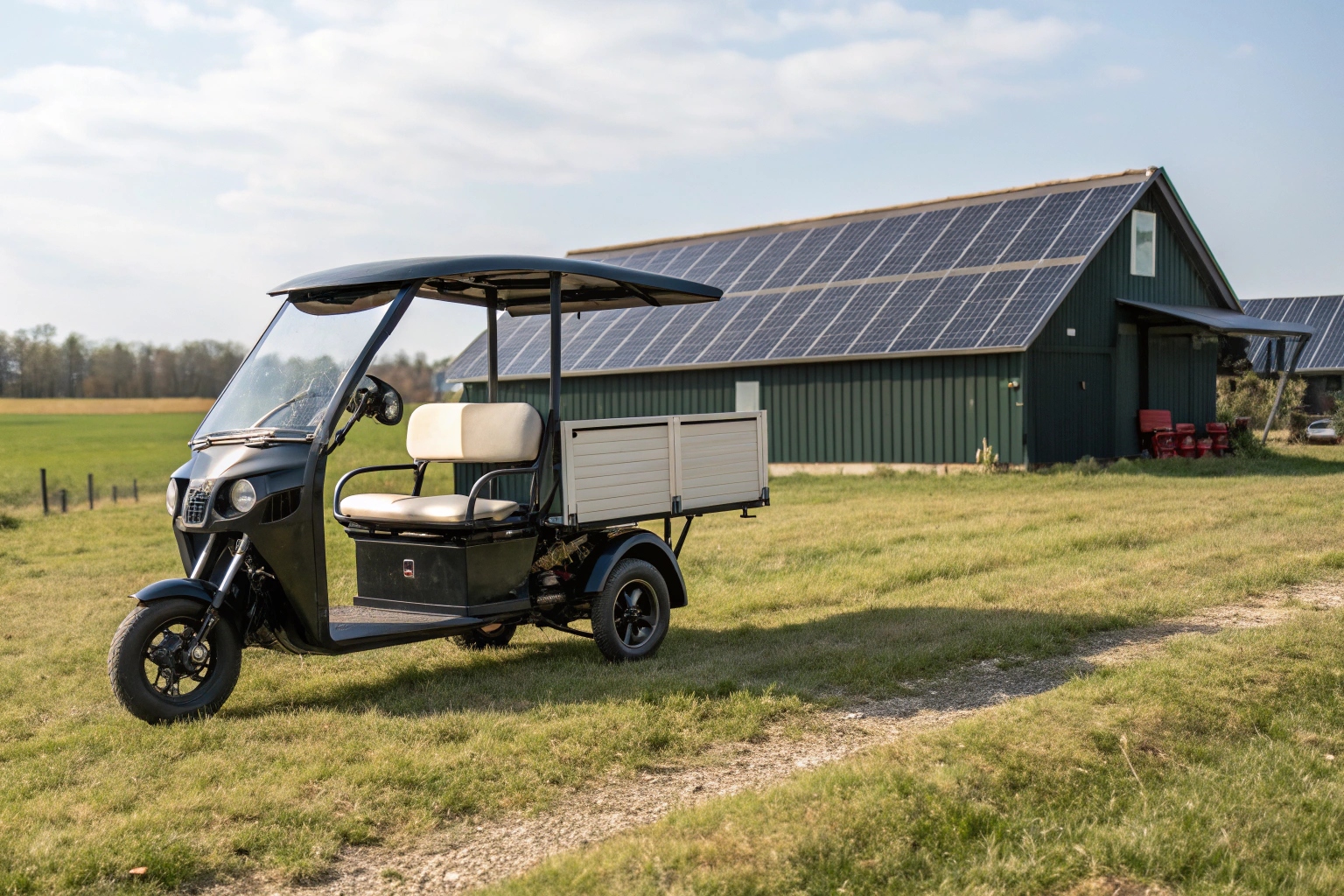
As a factory, we are seeing a major shift in what our B2B clients are asking for. A few years ago, the conversation was only about price and performance. Now, sustainability is a key topic. Importers and distributors recognize that the future of farm machinery is electric. It's not just about being "green"; it's a smart business decision. An electric tricycle saves the farmer money, reduces their carbon footprint, and improves the farm itself. Let's break down the real, practical benefits we see from our partners who supply these vehicles to agricultural markets.
Hoeveel kan elektriese driewinkels kweekhuisgasvrystellings op plase verminder?
Farms rely on diesel engines that are known polluters. This contributes to agriculture's overall carbon footprint, a problem that regulations and consumers are paying more attention to every day.
Switching from a diesel machine to an electric one can cut lifecycle greenhouse gas emissions by over 90%. This massive reduction comes from the electric motor's high efficiency and the ability to use clean, renewable electricity.
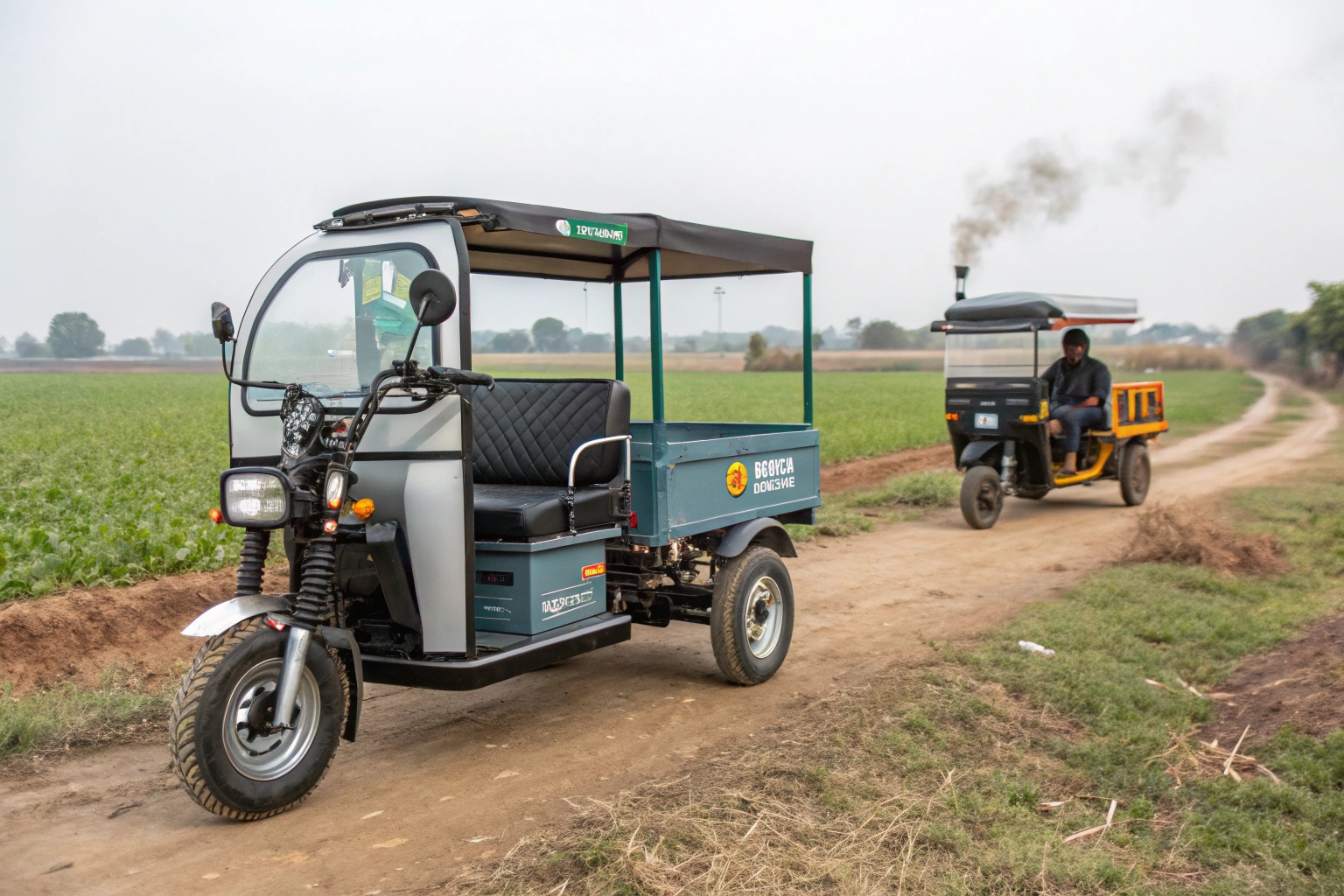
This isn't just about what comes out of the tailpipe. The real impact is measured over the vehicle's entire life, including the energy it uses. A diesel engine is very inefficient; a lot of the fuel it burns is wasted as heat instead of being converted into power. An electric motor, by contrast, is incredibly efficient, with over 90% of the energy from the battery being used to turn the wheels. This fundamental difference is why the emissions savings are so huge. Even when charging from a standard electrical grid, the Lewensiklusvrystellings is baie laer. Wanneer 'n plaas sy eie gebruik Hernubare energie, soos sonpanele, daal die uitstoot van daaglikse werking tot feitlik nul. Dit is 'n kragtige verkooppunt wat die gesprek verder as eenvoudige koste tot langtermynwaarde en verantwoordelikheid beweeg.
Emissies: Diesel teen elektries
| Emissiebron | Klein dieselenjin | Elektriese motor |
|---|---|---|
| Stertpypvrystellings | Co₂, NOx, deeltjies | Nul |
| Lewensiklusvrystellings | Hoog (brandstofproduksie + verbranding) | Baie laag (Grid + hoë doeltreffendheid) |
| Energiedoeltreffendheid | ~ 25-30% | ~ 90%+ |
Watter besparingskoste bied elektriese driewiele boere aan?
Brandstof en onderhoud is twee van die grootste en onvoorspelbare koste op 'n plaas. 'N Afgebreekte enjin gedurende die oesseisoen kan 'n boer duisende in verlore produktiwiteit en herstelrekeninge kos.
Elektriese driewiele verlaag dramaties die loopkoste. Met geen brandstof om te koop en minimale onderhoud nie, kan boere hul totale koste vir voertuigbesit met 30% of meer besnoei. Dit verhoog hul winsgewendheid elke dag direk.
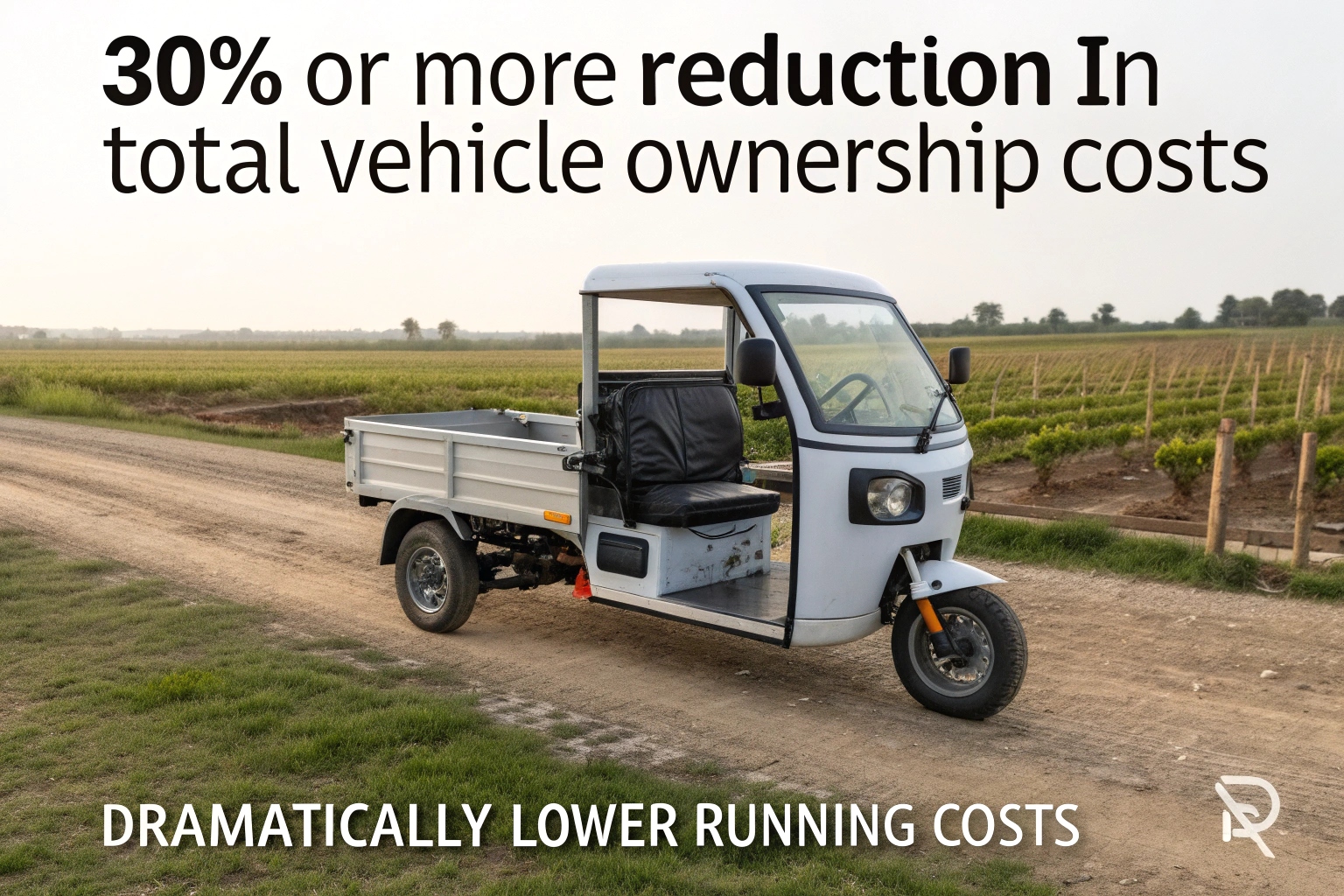
This is where the benefit becomes very real for a farmer. From my factory experience, I can tell you that electric is the future because it is cheaper to run. It's a simple economic truth. First, the "fuel" cost is much lower. The price of charging a battery with overnight electricity is a fraction of the cost of filling a tank with diesel. Second, the maintenance savings are enormous. An electric motor has one moving part. A diesel engine has hundreds. This means there are no oil changes, no filters to replace, no spark plugs, and no complex exhaust systems to fix. Our B2B partners tell us their customers save up to 40% on annual maintenance. This also means the vehicle spends more time working and less time in the workshop, which is a critical advantage during the busy seasons.
Hoe verbeter elektriese driewiele lug- en geraasgehalte in landbou -instellings?
Die konstante geraas en uitlaatgasse van dieseltoerusting word net as deel van die plaaslewe aanvaar. Maar hierdie besoedeling beïnvloed die gesondheid van werkers en veroorsaak stres aan vee.
Elektriese driewiele het geen uitstoot van stertpyp en is 50-70% stiller as dieselmasjiene nie. Dit skep skoner lug vir werkers om asem te haal en 'n rustiger, minder stresvolle omgewing vir diere.
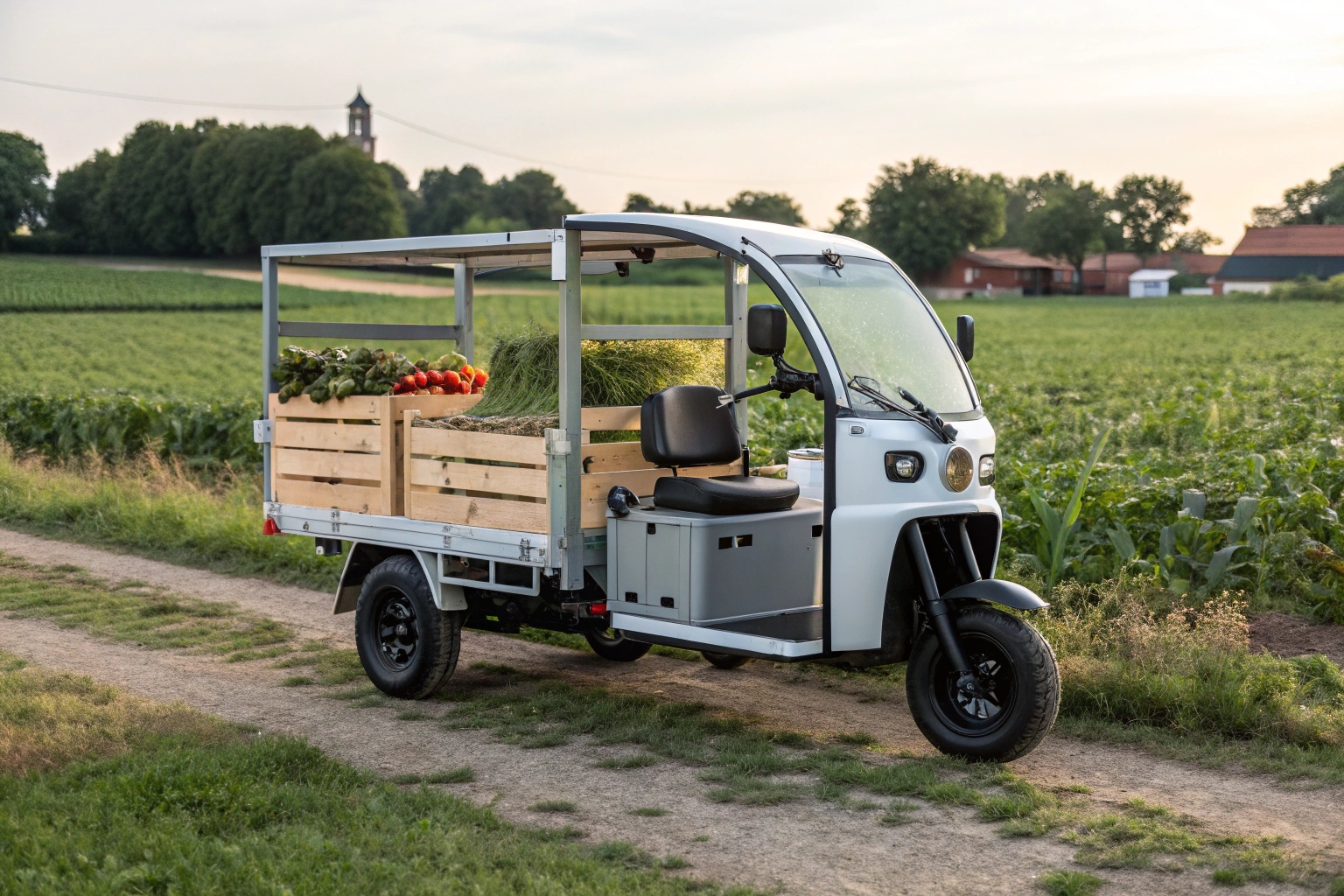
Dit is 'n voordeel wat u kan voel. Die oomblik dat 'n boer van 'n sputterende dieselenjin na 'n stille elektriese motor, die hele werksomgewing verander. Eerstens is die lug skoner. Met Nul stertpypvrystellings, workers are no longer breathing in harmful diesel fumes, which is a major health benefit, especially when working inside barns or greenhouses. We've seen these trikes become essential for tasks in enclosed spaces. Second, the reduction in noise is dramatic. A quiet farm is a less stressful farm, for both people and animals. Livestock, particularly dairy cows and poultry, are known to be sensitive to loud noises. A calmer environment can lead to better animal welfare and even improved productivity. It also makes it easier for farm workers to communicate with each other without shouting over a loud engine. It's a simple change that improves the quality of life on the farm.
Kan die lading van sonkrag die omgewingsvoordele van elektriese driewiele op plase verder verbeter?
Selfs 'n elektriese voertuig maak steeds staat op die kragnetwerk vir sy energie. As die rooster deur fossielbrandstowwe aangedryf word, is die voertuig nie werklik nul-emissie nie.
Absoluut. Die laai van 'n elektriese boerdery met sonpanele op die perseel skep 'n 100% hernubare en selfversorgende energielus. Dit elimineer die afhanklikheid van die netwerk en behaal 'n byna nul operasionele koolstofvoetspoor vir die voertuig.
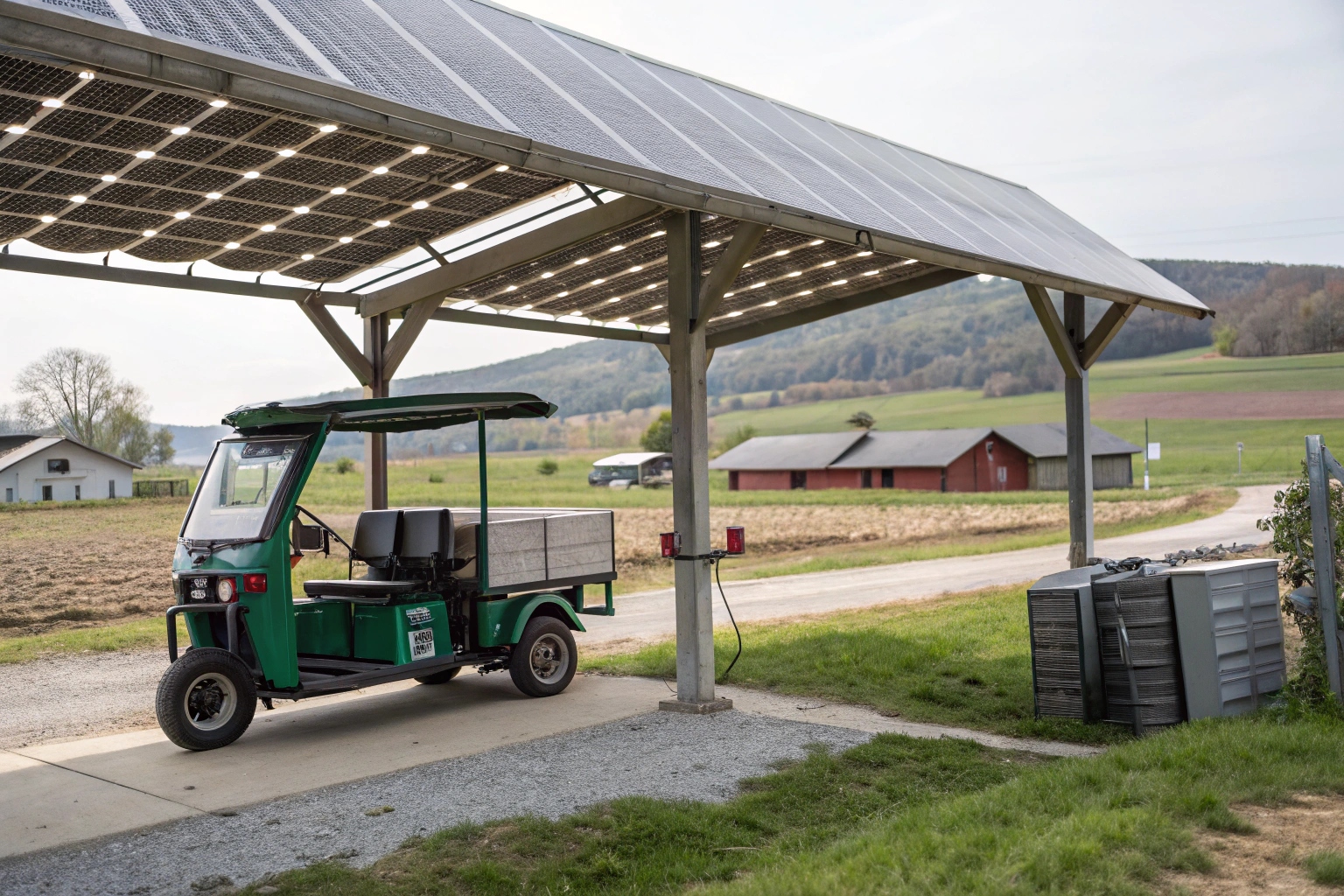
Dit is die uiteindelike doel vir 'n waarlik volhoubare plaas. Baie plase het groot skure, skure of werkswinkels met groot dakke wat perfek is om te installeer sonpanele. By generating their own electricity from the sun, farmers can essentially create their own "fuel" for free. This synergy between solar power and electric vehicles is a perfect match. It not only cuts lifecycle emissions by another 40% compared to charging from the grid, but it also makes the farm energy-independent. The farmer is no longer affected by rising electricity prices or unstable fuel markets. The initial investment in a solar system can be paid back quickly through the massive savings on vehicle fuel. For our distributors, this presents an opportunity to offer a complete energy and transport solution, positioning them as forward-thinking partners for modern farms.
Afsluiting
Die skuif na Electric op die plaas is 'n wen-wen. Dit bied duidelike omgewingsvoordele, reële kostebesparing en 'n gesonder werkplek, wat dit 'n noodsaaklike opgradering vir die moderne boer maak.

